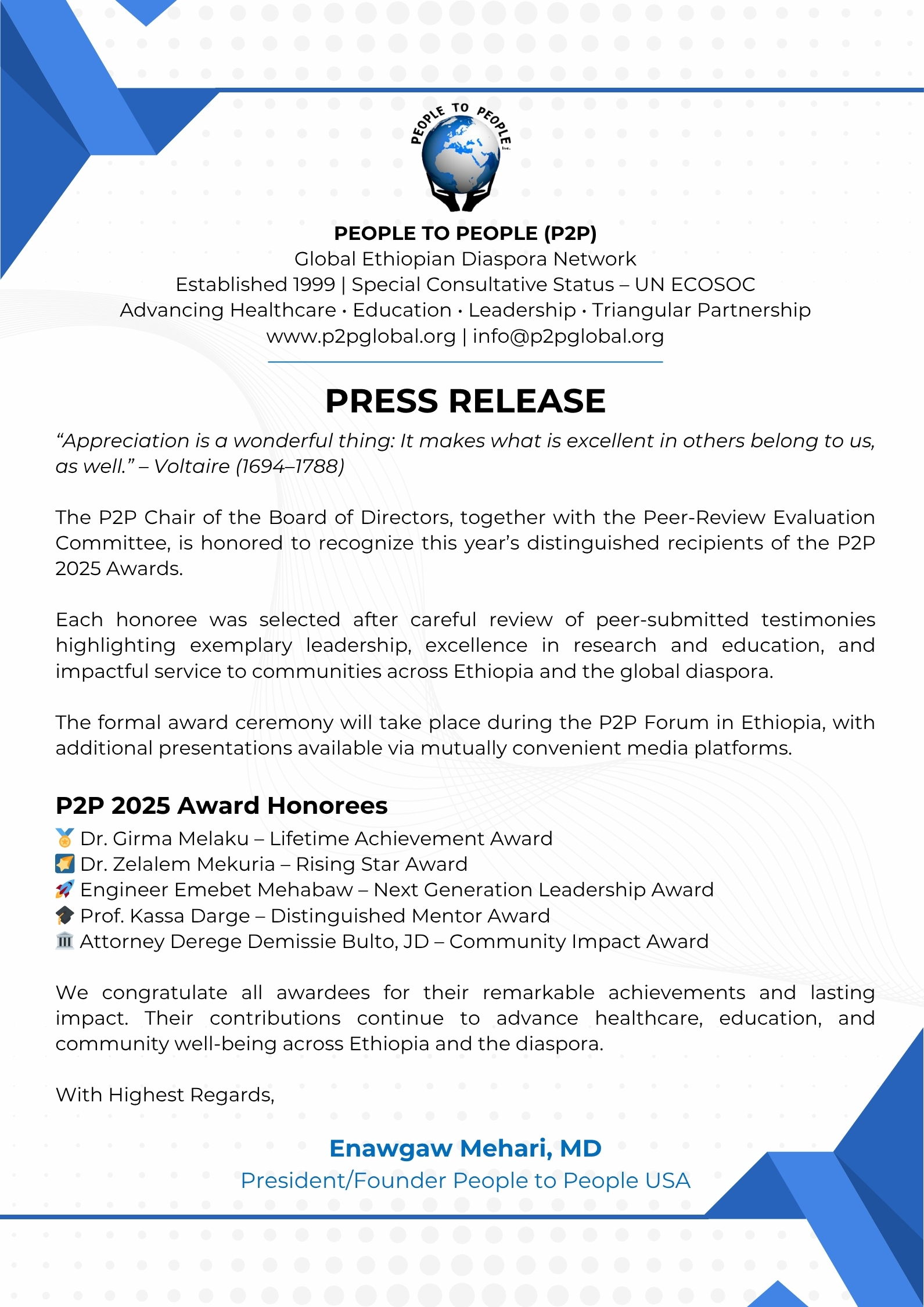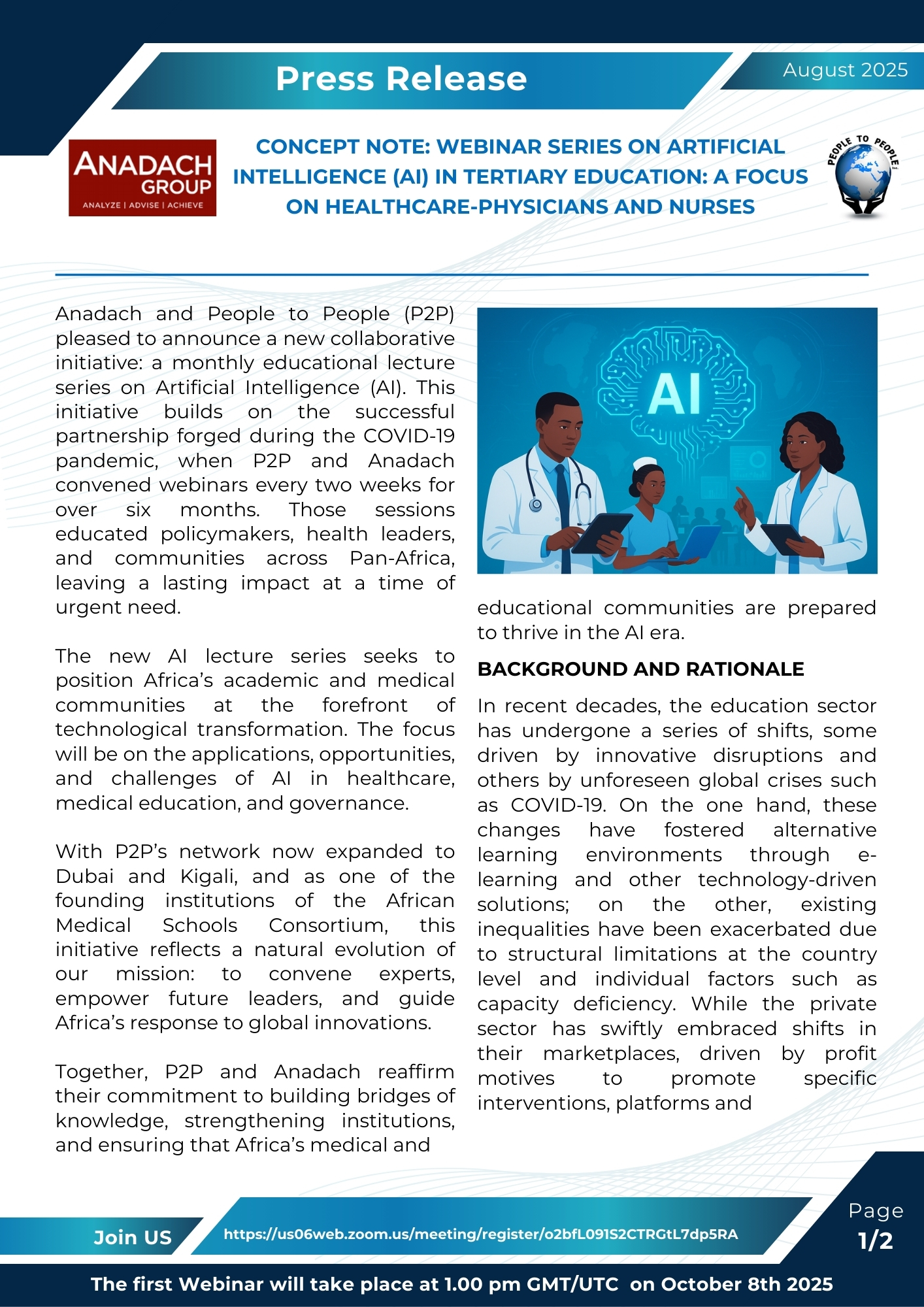🌐 Online Webinar II: AI in Clinical Practice & Continuous Training/Capacity Enhancement in Healthcare
Anadach & People to People present: Explore how AI is transforming healthcare delivery and professional development. Join us to learn,
Key Points about the Accreditation Agreement
1. Origins and Leadership The Accreditation Agreement is the result of a collaborative effort among several esteemed organizations, including the Consortium of Medical Education (COME), Ethiopian Medical Association (EMA), Ethiopian Teachers Association (ETA), Ministry of Health (MoH), Ministry of Education (MoE), and People to People (P2P). The initiative is guided by collective leadership, with Dr. Lekidelu Tadesse playing a pivotal role in steering the project towards success.
2. Objective and Scope The primary objective of this initiative is to establish a robust accreditation system that ensures the highest standards in educational and healthcare institutions across Ethiopia. The scope of this project is vast, covering various sectors to enhance the quality and reliability of medical and educational services nationwide.
3. Historic Proportions This project is of historic significance due to its comprehensive and far-reaching impact on Ethiopia’s educational and healthcare systems. It aims to build a sustainable framework with a legacy of institutional memory, ensuring that the standards set today continue to benefit future generations.
4. Collaborative Framework The project operates under a framework of collective leadership, leveraging the unique strengths and expertise of each participating organization. This collaborative approach ensures seamless integration and coordination among stakeholders, driving the initiative towards achieving its common goals.
5. System and Standards Development One of the key outcomes of this initiative is the development of rigorous accreditation standards that align with international benchmarks and best practices. The project also establishes mechanisms for continuous monitoring, evaluation, and improvement of accredited institutions, ensuring that they consistently meet high standards.
6. Capacity Building and Support To support institutions in meeting accreditation standards, the project implements capacity-building initiatives. These initiatives include training programs designed to enhance the capabilities of staff and faculty. Additionally, ongoing technical assistance and support are provided to institutions undergoing the accreditation process.
7. Quality Assurance and Compliance The project ensures that accredited institutions adhere to the established standards through regular monitoring and evaluation. Robust quality assurance mechanisms are in place to maintain high standards and drive continuous improvement in service delivery.
8. Impact and Outcomes The ultimate impact of this initiative will be the enhanced quality of education and healthcare services in Ethiopia. Achieving recognition from international accrediting bodies will further elevate the global standing of Ethiopian institutions. The long-term benefits of this project include establishing a legacy of high standards and continuous improvement, positively impacting future generations.
In the Ethiopian Context This initiative is a showcase of how various organizations can work together towards a common goal, leveraging their unique strengths and resources to achieve significant outcomes. It exemplifies the power of collaboration in driving national development and building a better future for all.
Anadach & People to People present: Explore how AI is transforming healthcare delivery and professional development. Join us to learn,
People to People (P2P) proudly announces the 2025 Award Honorees, recognized for outstanding leadership, community impact, and service across Ethiopia
📅 Date: October 27–28, 2025📍 Location: University of Dubai, UAE People to People (P2P) proudly participated in a panel discussion
📅 Date: 8 October 2025🕐 Time: 1:00 PM GMT / UTC💻 Online via Zoom 🔗 Register here: https://us02web.zoom.us/meeting/register/nv4zuh4oSAGWpigrsqnLDA Organized by
Happy Ethiopian New Year https://www.youtube.com/shorts/x7mACuXgdow
Anadach & People to People (P2P) are excited to launch a monthly webinar series on Artificial Intelligence (AI) in tertiary


